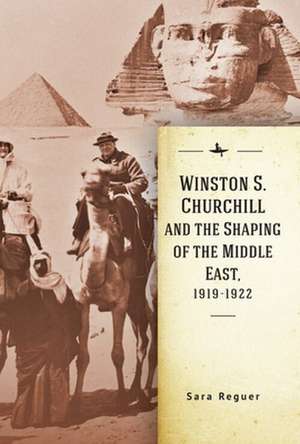Winston S. Churchill and the Shaping of the Middle East, 1919-1922
Autor Sara Regueren Limba Engleză Paperback – 3 noi 2020
While most books on Churchill attempt to cover the course of his political and personal career, this volume exclusively focuses on the Middle East during the formative years of 1919-1922 and explores the foundations of some of the Middle East's most problematic issues today.
| Toate formatele și edițiile | Preț | Express |
|---|---|---|
| Paperback (1) | 141.63 lei 3-5 săpt. | |
| Academic Studies Press – 3 noi 2020 | 141.63 lei 3-5 săpt. | |
| Hardback (1) | 716.17 lei 6-8 săpt. | |
| Academic Studies Press – 2 noi 2020 | 716.17 lei 6-8 săpt. |
Preț: 141.63 lei
Nou
Puncte Express: 212
Preț estimativ în valută:
27.10€ • 28.30$ • 22.43£
27.10€ • 28.30$ • 22.43£
Carte disponibilă
Livrare economică 14-28 martie
Preluare comenzi: 021 569.72.76
Specificații
ISBN-13: 9781644693339
ISBN-10: 164469333X
Pagini: 238
Dimensiuni: 152 x 229 x 13 mm
Greutate: 0.32 kg
Editura: Academic Studies Press
ISBN-10: 164469333X
Pagini: 238
Dimensiuni: 152 x 229 x 13 mm
Greutate: 0.32 kg
Editura: Academic Studies Press
Cuprins
Chapter 1: Winston S. Churchill and the Middle East
Chapter 2: Great Britain and the Middle East
Chapter 3: Secretary of State for War and Air
Chapter 4: Middle East Dilemmas
Chapter 5: Secretary of State for the Colonies
Chapter 6: The Cairo Conference of 1921
Chapter 7: Approval of Parliament
Chapter 8: Slow Progress
Chapter 9: No Progress
Chapter 10: Iraq: From Stalemate to Solution
Chapter 11: Policy for Palestine
Chapter 12: Summary and Conclusion
Chapter 2: Great Britain and the Middle East
Chapter 3: Secretary of State for War and Air
Chapter 4: Middle East Dilemmas
Chapter 5: Secretary of State for the Colonies
Chapter 6: The Cairo Conference of 1921
Chapter 7: Approval of Parliament
Chapter 8: Slow Progress
Chapter 9: No Progress
Chapter 10: Iraq: From Stalemate to Solution
Chapter 11: Policy for Palestine
Chapter 12: Summary and Conclusion
Descriere
Can one person influence the course of history? The subject of this book concludes that in the example of Churchill and the Middle East in the post-World War I period, the answer is in the affirmative.
